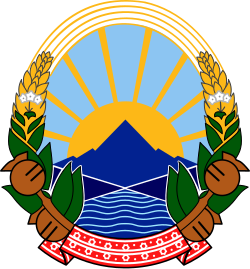| Party | Votes | % | Seats |
|---|
| Together for Macedonia | 494,744 | 41.42 | 60 |
| VMRO-DPMNE–Liberal Party | 298,404 | 24.98 | 33 |
| Democratic Union for Integration | 144,913 | 12.13 | 16 |
| Democratic Party of Albanians | 63,695 | 5.33 | 7 |
| Party for Democratic Prosperity | 28,397 | 2.38 | 2 |
| National Democratic Party | 26,237 | 2.20 | 1 |
| Socialist Party of Macedonia | 25,976 | 2.17 | 0 |
| Democratic Alternative | 17,473 | 1.46 | 0 |
| Democratic Union | 15,099 | 1.26 | 0 |
| VMRO-Macedonia | 10,436 | 0.87 | 0 |
| VMRO-VMRO–DPPESM–MHP | 8,484 | 0.71 | 0 |
| Union of Roma in Macedonia | 7,036 | 0.59 | 1 |
| New Democracy | 6,172 | 0.52 | 0 |
| LD [ mk ]–DSSM–PVM–DMP–PDDE–SDAM [ sv ] | 6,062 | 0.51 | 0 |
| Democratic Centre–Party of the Greens [ sv ] | 6,019 | 0.50 | 0 |
| Social Democratic Party | 3,493 | 0.29 | 0 |
| Macedonian Alliance [ mk ]–Macedonian People's Party | 2,454 | 0.21 | 0 |
| Democratic Party of Macedonia | 2,326 | 0.19 | 0 |
| Rebirth and Alliance for a Macedonian National Ideal | 2,303 | 0.19 | 0 |
| People's Movement of Macedonia [ mk ] | 2,247 | 0.19 | 0 |
| MAAK–The Only Macedonian Option | 2,208 | 0.18 | 0 |
| Republican Party of Macedonia | 2,167 | 0.18 | 0 |
| Party for the Full Emancipation of the Roma of Macedonia | 2,149 | 0.18 | 0 |
| DOM–Party of Pensioners | 2,077 | 0.17 | 0 |
| Communist Party of Macedonia | 1,969 | 0.16 | 0 |
| People's Will | 1,262 | 0.11 | 0 |
| Party for Justice [ sv ] | 1,139 | 0.10 | 0 |
| Progressive Party | 924 | 0.08 | 0 |
| All-Macedonian Workers' Party | 309 | 0.03 | 0 |
| Democratic Party "Go Macedonia–Forza" | 273 | 0.02 | 0 |
| United Party of Romas in Macedonia | 239 | 0.02 | 0 |
| VMRO-United | 120 | 0.01 | 0 |
| Bosniak Democratic Party [ sv ] | 45 | 0.00 | 0 |
| Independents | 7,571 | 0.63 | 0 |
| Total | 1,194,422 | 100.00 | 120 |
|
| Valid votes | 1,194,422 | 97.69 | |
|---|
| Invalid/blank votes | 28,289 | 2.31 | |
|---|
| Total votes | 1,222,711 | 100.00 | |
|---|
| Registered voters/turnout | 1,664,296 | 73.47 | |
|---|
| Source: Nohlen & Stöver |
